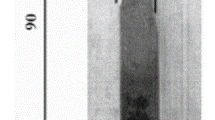Abstract
An analysis is presented for the mechanics of guillotining and experiments on a number of solids are described which agree with the theory. Irreversible work not associated with the cutting process (i.e. work of bending or plastic flow) is least when guillotining thin flexible sheets, and experiments on such materials permit determination of the specific work of fracture, once frictional effects have been compensated for. The results are compared with values of fracture toughness obtained by other methods. The analysis is extended to cover the formation of burrs at the cut edge of metal sheets. Comments are also made about the type of friction in guillotining and other scissor-type devices having “set” blades which scrape along one another during cutting.
Similar content being viewed by others
References
T. M. Chang andH. W. Swift,J. Inst. Metals 78 (1950–51) 119.
O. W. Boston, “Metal Processing”, 2nd edn. (Wiley, New York, 1951).
A. G. Atkins andD. K. Felbeck,Chartered Mech. Engr. (1974) 78.
K. M. Ngan, Ph.D. Dissertation, University of Hong Kong (1971).
Y. W. Mai,J. Mater. Sci. 10 (1975) 1271.
R. S. Seth andD. H. Page,ibid. 9 (1974) 1745.
Y. W. Mai,Corrosion-NACE 32 (1976) 336.
Author information
Authors and Affiliations
Rights and permissions
About this article
Cite this article
Atkins, A.G., Mai, Y.W. On the guillotining of materials. J Mater Sci 14, 2747–2754 (1979). https://doi.org/10.1007/BF00610649
Received:
Accepted:
Issue Date:
DOI: https://doi.org/10.1007/BF00610649




